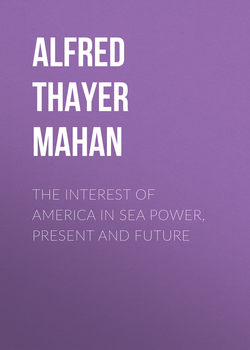The Interest of America in Sea Power, Present and Future

Реклама. ООО «ЛитРес», ИНН: 7719571260.
Оглавление
Alfred Thayer Mahan. The Interest of America in Sea Power, Present and Future
PREFACE
THE UNITED STATES LOOKING OUTWARD
HAWAII AND OUR FUTURE SEA POWER
THE ISTHMUS AND SEA POWER.1
POSSIBILITIES OF AN ANGLO-AMERICAN REUNION
THE FUTURE IN RELATION TO AMERICAN NAVAL POWER
PREPAREDNESS FOR NAVAL WAR
A TWENTIETH-CENTURY OUTLOOK
THE STRATEGIC FEATURES OF THE GULF OF MEXICO AND THE CARIBBEAN SEA
Отрывок из книги
Indications are not wanting of an approaching change in the thoughts and policy of Americans as to their relations with the world outside their own borders. For the past quarter of a century, the predominant idea, which has asserted itself successfully at the polls and shaped the course of the government, has been to preserve the home market for the home industries. The employer and the workman alike have been taught to look at the various economical measures proposed from this point of view, to regard with hostility any step favoring the intrusion of the foreign producer upon their own domain, and rather to demand increasingly rigorous measures of exclusion than to acquiesce in any loosening of the chain that binds the consumer to them. The inevitable consequence has followed, as in all cases when the mind or the eye is exclusively fixed in one direction, that the danger of loss or the prospect of advantage in another quarter has been overlooked; and although the abounding resources of the country have maintained the exports at a high figure, this flattering result has been due more to the superabundant bounty of Nature than to the demand of other nations for our protected manufactures.
For nearly the lifetime of a generation, therefore, American industries have been thus protected, until the practice has assumed the force of a tradition, and is clothed in the mail of conservatism. In their mutual relations, these industries resemble the activities of a modern ironclad that has heavy armor, but inferior engines and guns; mighty for defence, weak for offence. Within, the home market is secured; but outside, beyond the broad seas, there are the markets of the world, that can be entered and controlled only by a vigorous contest, to which the habit of trusting to protection by statute does not conduce.
.....
It is perfectly reasonable and legitimate, in estimating our needs of military preparation, to take into account the remoteness of the chief naval and military nations from our shores, and the consequent difficulty of maintaining operations at such a distance. It is equally proper, in framing our policy, to consider the jealousies of the European family of states, and their consequent unwillingness to incur the enmity of a people so strong as ourselves; their dread of our revenge in the future, as well as their inability to detach more than a certain part of their forces to our shores without losing much of their own weight in the councils of Europe. In truth, a careful determination of the force that Great Britain or France could probably spare for operations against our coasts, if the latter were suitably defended, without weakening their European position or unduly exposing their colonies and commerce, is the starting-point from which to calculate the strength of our own navy. If the latter be superior to the force that thus can be sent against it, and the coast be so defended as to leave the navy free to strike where it will, we can maintain our rights; not merely the rights which international law concedes, and which the moral sense of nations now supports, but also those equally real rights which, though not conferred by law, depend upon a clear preponderance of interest, upon obviously necessary policy, upon self-preservation, either total or partial. Were we so situated now in respect of military strength, we could secure our perfectly just claim as to the seal fisheries; not by seizing foreign ships on the open sea, but by the evident fact that, our cities being protected from maritime attack, our position and superior population lay open the Canadian Pacific, as well as the frontier of the Dominion, to do with as we please. Diplomats do not flourish such disagreeable truths in each other's faces; they look for a modus vivendi , and find it.
While, therefore, the advantages of our own position in the western hemisphere, and the disadvantages under which the operations of a European state would labor, are undeniable and just elements in the calculations of the statesman, it is folly to look upon them as sufficient alone for our security. Much more needs to be cast into the scale that it may incline in favor of our strength. They are mere defensive factors, and partial at that. Though distant, our shores can be reached; being defenceless, they can detain but a short time a force sent against them. With a probability of three months' peace in Europe, no maritime power would fear to support its demands by a number of ships with which it would be loath indeed to part for a year.
.....